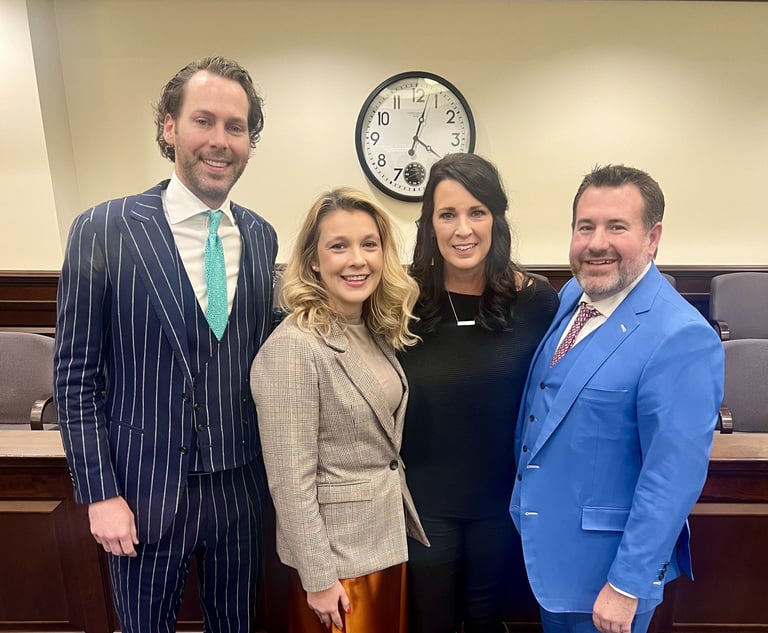'Seismic' Insurance Stacking Decision Applies Retroactively, Federal Judge Rules
The Pennsylvania Supreme Court's "seismic" decision to invalidate the household exclusion as a means of getting around providing stacking coverage should apply retroactively, a federal judge has ruled in a decision that could impact several class action lawsuits pending in the Keystone State.
April 24, 2019 at 06:01 PM
4 minute read
 Photo: Shutterstock
Photo: Shutterstock
The Pennsylvania Supreme Court's “seismic” decision to invalidate the household exclusion as a means of getting around providing stacking coverage should apply retroactively, a federal judge has ruled in a decision that could impact several class action lawsuits pending in the Keystone State.
Earlier this month, U.S. District Judge Mark Kearney of the Eastern District of Pennsylvania ruled in Butta v. Geico that the Supreme Court's January decision in Gallagher v. Geico should apply retroactively. In Gallagher the justices ruled 5-2 that a household exclusion in a Geico policy violated the Motor Vehicle Financial Responsibility Law because it acted as a “de facto waiver” of stacked coverage.
Since that decision came down, five class action lawsuits have been filed aimed at compensating those who have had their stacking benefits denied under the exclusion. Butta is one of those proposed class actions.
Kearney focused his 26-page decision in Butta on predicting how the Pennsylvania Supreme Court would rule on the issue of whether Gallagher, which has been described by litigators as a “seismic” ruling, should apply retroactively. Honing in on language that Justice Max Baer used in the majority's opinion in Gallagher, Kearney determined that the court did not announce a new rule of Pennsylvania law, and therefore the ruling should apply retroactively.
“As we sit in diversity, it is our duty to 'predict' how the Pennsylvania Supreme Court would rule on the retroactivity of Gallagher,” Kearney said. “We must prioritize the Pennsylvania Supreme Court's own language from the very case we decide to apply to Mr. [Francis] Butta's case.”
Schmidt Kramer attorney Scott Cooper, who, along with James Haggerty of Haggerty, Goldberg, Schleifer & Kupersmith, filed the proposed class action lawsuits, said the ruling should expand the size of the potential class, opening up the possibility of pursuing claims dating as far back as 1990, when the MVFRL was passed.
“I think the breadth and how well written the opinion was, it throws a lot of cold water on any other argument about how it applies,'” Cooper said.
Defendants, Cooper said, are likely to use statute of limitations issues to try to limit the size of the class, and issues about tolling in cases where benefits were denied to minors and whether claimants needed to file a claim, rather than simply be denied stacking, to qualify as a class member are likely to be disputed as well.
Haggerty added that he hoped the ruling would provide some guidance for the four other class actions, which are pending before judges in the Eastern District and the Philadelphia Court of Common Pleas.
“We hope that it will provide a template for resolution of this issue by other judges and other courts,” he said.
Kymberly Kochis of Eversheds Sutherland, who is representing Geico, did not return a call seeking comment.
The proposed class actions, which, in addition to Geico, were filed against Allstate, Pennsylvania National Mutual Casualty Insurance Co., Donegal Mutual Insurance and USAA, hinge on arguments that the insurance companies improperly used household exclusions to bar stacked coverage as far back as 1990. But the companies have pushed back, in some cases arguing that benefits denied before the recent Gallagher decision were done so based on established court precedent that specifically allowed the practice.
“In issuing its policies and setting these premiums, Geico Casualty relied on [Erie Insurance Exchange v.] Baker and the well-settled law in Pennsylvania validating the household vehicle exclusion,” Geico had contended. “To now hold Geico Casualty retroactively to the new rule set out in Gallagher would require Geico Casualty to 'pay on a risk it did not knowingly insure, or collect a premium to underwrite.'”
Kearney, however, cited language in Gallagher that differentiated the case from those prior decisions, and said the ruling was meant to apply retroactively.
“The Pennsylvania Supreme Court in Gallagher did not announce a new rule of Pennsylvania law because it did not express a 'fundamental break from precedent' or modify a 'previous opinion' of the Pennsylvania Supreme Court,” Kearney said. “The Pennsylvania Supreme Court's holding in Gallagher does not change binding Pennsylvania law. As a result, Gallagher applies to the MVFRL since its inception and applies to Mr. Butta's policy.”
This content has been archived. It is available through our partners, LexisNexis® and Bloomberg Law.
To view this content, please continue to their sites.
Not a Lexis Subscriber?
Subscribe Now
Not a Bloomberg Law Subscriber?
Subscribe Now
NOT FOR REPRINT
© 2025 ALM Global, LLC, All Rights Reserved. Request academic re-use from www.copyright.com. All other uses, submit a request to [email protected]. For more information visit Asset & Logo Licensing.
You Might Like
View All
Philadelphia Eagles 0-2 in Attempts to Recover Insurance on COVID-Related Losses
4 minute read
High Verdicts and Venue Rule Land Pa. Courts on Top of 'Judicial Hellhole' List
5 minute read

Judge Approves $667K Settlement Against Independence Blue Cross for Unpaid, Pre-Shift Computer Work
4 minute readTrending Stories
- 1M&A Transactions and AB 1824: Navigating New Privacy Compliance Challenges
- 2Devin Nunes, Former California GOP Congressman, Loses Move to Revive Defamation Suit
- 3Judge Sides With Retail Display Company in Patent Dispute Against Campbell Soup, Grocery Stores
- 4Is It Time for Large UK Law Firms to Begin Taking Private Equity Investment?
- 5Federal Judge Pauses Trump Funding Freeze as Democratic AGs Launch Defensive Measure
Who Got The Work
J. Brugh Lower of Gibbons has entered an appearance for industrial equipment supplier Devco Corporation in a pending trademark infringement lawsuit. The suit, accusing the defendant of selling knock-off Graco products, was filed Dec. 18 in New Jersey District Court by Rivkin Radler on behalf of Graco Inc. and Graco Minnesota. The case, assigned to U.S. District Judge Zahid N. Quraishi, is 3:24-cv-11294, Graco Inc. et al v. Devco Corporation.
Who Got The Work
Rebecca Maller-Stein and Kent A. Yalowitz of Arnold & Porter Kaye Scholer have entered their appearances for Hanaco Venture Capital and its executives, Lior Prosor and David Frankel, in a pending securities lawsuit. The action, filed on Dec. 24 in New York Southern District Court by Zell, Aron & Co. on behalf of Goldeneye Advisors, accuses the defendants of negligently and fraudulently managing the plaintiff's $1 million investment. The case, assigned to U.S. District Judge Vernon S. Broderick, is 1:24-cv-09918, Goldeneye Advisors, LLC v. Hanaco Venture Capital, Ltd. et al.
Who Got The Work
Attorneys from A&O Shearman has stepped in as defense counsel for Toronto-Dominion Bank and other defendants in a pending securities class action. The suit, filed Dec. 11 in New York Southern District Court by Bleichmar Fonti & Auld, accuses the defendants of concealing the bank's 'pervasive' deficiencies in regards to its compliance with the Bank Secrecy Act and the quality of its anti-money laundering controls. The case, assigned to U.S. District Judge Arun Subramanian, is 1:24-cv-09445, Gonzalez v. The Toronto-Dominion Bank et al.
Who Got The Work
Crown Castle International, a Pennsylvania company providing shared communications infrastructure, has turned to Luke D. Wolf of Gordon Rees Scully Mansukhani to fend off a pending breach-of-contract lawsuit. The court action, filed Nov. 25 in Michigan Eastern District Court by Hooper Hathaway PC on behalf of The Town Residences LLC, accuses Crown Castle of failing to transfer approximately $30,000 in utility payments from T-Mobile in breach of a roof-top lease and assignment agreement. The case, assigned to U.S. District Judge Susan K. Declercq, is 2:24-cv-13131, The Town Residences LLC v. T-Mobile US, Inc. et al.
Who Got The Work
Wilfred P. Coronato and Daniel M. Schwartz of McCarter & English have stepped in as defense counsel to Electrolux Home Products Inc. in a pending product liability lawsuit. The court action, filed Nov. 26 in New York Eastern District Court by Poulos Lopiccolo PC and Nagel Rice LLP on behalf of David Stern, alleges that the defendant's refrigerators’ drawers and shelving repeatedly break and fall apart within months after purchase. The case, assigned to U.S. District Judge Joan M. Azrack, is 2:24-cv-08204, Stern v. Electrolux Home Products, Inc.
Featured Firms
Law Offices of Gary Martin Hays & Associates, P.C.
(470) 294-1674
Law Offices of Mark E. Salomone
(857) 444-6468
Smith & Hassler
(713) 739-1250





